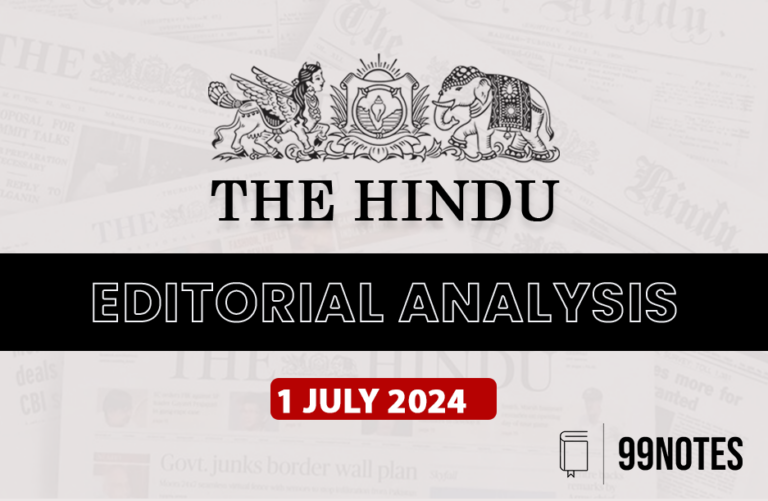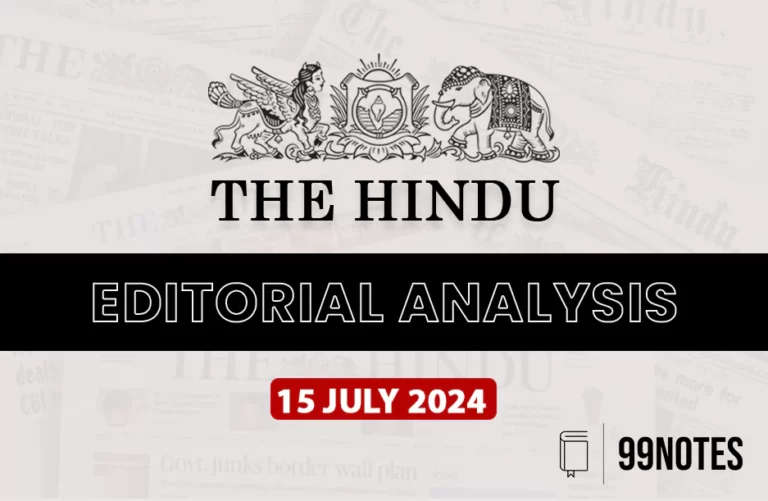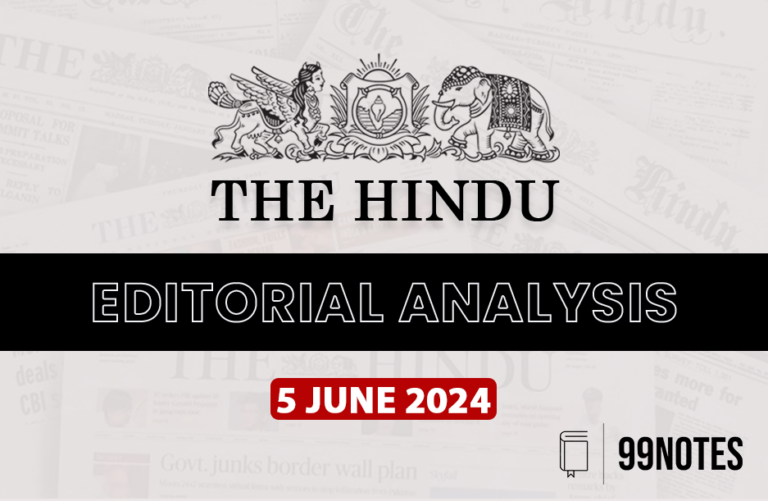9 November 2023 : The Hindu Editorial Notes PDF
The Hindu Editorial
9-November-2023
1. An under-discussed facet of colonial history.
Topic: GS3 – Indian economy.
Bicentenary of Tamil Indentured Labourers in Sri Lanka (1823-2023):
- The bicentenary commemorates the arrival of Tamil indentured laborers in Sri Lanka in November 1823.
- The event called “Naam 200” in Colombo marked this significant milestone.
- Emphasis on the importance of understanding and remembering the historical impact of colonialism.
British Colonial Exploitation:
- British imperial project began as a form of licensed looting in service of capitalism, which significantly impacted India and Sri Lanka.
- Exploitative policies drained colonies of resources, economic strength, and political freedom, leading to poverty and desolation.
- In India, they decimated textile industries and displaced Indian farmers for opium cultivation, resulting in unemployment and landlessness.
Indentured Labor and “New Slavery”:
- As slavery was abolished, the British replaced it with a different form of bonded servitude known as “indentured labor.”
- Indentured laborers, including those from India, were subjected to harsh working conditions, mired in debt, and misled about their destinations.
The Impact on Sri Lankan Plantations:
- Sri Lanka transitioned from coffee to tea plantations, leading to an increased demand for Indian Tamil laborers.
- The arrival of Plantation Tamils in the 19th century was marked by discrimination and deprivation of basic rights and services.
- Colonial practices and policies rendered them “foreigners,” making assimilation into Sri Lankan society difficult.
Kanganies and Exploitative Systems:
- The kanganies, labor recruiters and overseers, played a dominant role in the recruitment and exploitation of Indian laborers on plantations.
- The indentured workers’ contracts with kanganies were vague, allowing for their abuse and debt accumulation.
- Colonial laws restricted landholding and homebuilding for Plantation Tamils, further limiting their economic prospects.
Identity and Integration:
- Despite the challenges, Plantation Tamils forged an identity rooted in Tamil linguistic and regional traditions.
- Over generations, they worked towards greater integration with Sri Lankan society, overcoming obstacles such as the Citizenship Act of 1948.
- Efforts of democratic parties like the Ceylon Workers’ Congress led to their citizenship and democratic rights.
Conclusion: Decolonization and Nation-Building
- Post-colonial countries must take steps to decolonize themselves from the practices, laws, and attitudes of their imperial past.
- Decolonization is vital for creating an inclusive post-colonial identity and nation-building that transcends historical oppression.
2. Taiwan, a Malacca blockade and India’s options
Topic: GS2 – International relations.
Constraints on India’s Options in the Strait of Malacca:
- International Law Considerations:Distant blockades away from a belligerent nation’s geography can be challenged under international law.
- Impact on Regional Trade:The Strait of Malacca is a crucial trade route for many countries, including India, Japan, and South Korea. Disrupting trade through the Strait would have significant economic consequences.
- Sovereignty of Other States: The Strait of Malacca passes through the sovereign waters of Indonesia, Malaysia,Thailand, and Singapore. These countries would be adversely affected by a naval blockade.
- Complexity of Commercial Shipping:Identifying and interdicting commercial shipping is a complex task due to the multinational nature of shipping activities.
- Alternative Routes:China has alternative routes for its trade and energy supplies, such as the Sunda and Lombok Straits.
- China’s Strategic Petroleum Reserves:China has substantial onshore and floating Strategic Petroleum Reserves (SPR) that can provide a buffer during disruptions.
- Risk of Escalation: A naval blockade or unilateral action against Chinese naval vessels could lead to a wider conflict, not limited to the maritime sphere.
- Unlikely Support from Regional Countries: Regional countries that rely on the Strait of Malacca for trade are unlikely to support unilateral action by India.
- China’s Influence:China has a permanent seat on the United Nations Security Council and significant regional influence, which it could use to thwart any effort to blockade its trade.
Lessons from the Past:
- Blockades in World Wars:Naval blockades in World War I and World War II led to wider conflicts.
- Iran-U.S. Tensions in the Strait of Hormuz:Interdiction of commercial shipping in the Strait of Hormuz has escalated tensions between Iran and the U.S.
Conflict Scenarios:
- S. Support for Indian Blockade:It is unclear whether the U.S. would support India’s interdiction of Chinese vessels in a bilateral conflict between India and China.
- India’s Role in a U.S.-China Conflict: India’s primary role in a U.S.-China conflict over Taiwan would likely be limited to defending its territorial interests and sea lines of communication.
- India’s Focus on Continental Borders: India’s primary focus would remain on its continental borders with China.
Conclusion:
- S.-India Partnership:The U.S.-India partnership is expected to strengthen in the years ahead, potentially providing India with more support in a conflict scenario.
- India’s Importance in the Indo-Pacific:A strong India can contribute to stability and multi-polarity in the Indo-Pacific region.
Question: In view of the growing tensions between the United States and China in the Indo-Pacific region, critically examine India’s strategic options in the Strait of Malacca, considering both the potential benefits and risks of any action.
3. Move towards e-FIR, but with caution
Topic: GS2 – Indian polity.
Introduction of e-FIR in India:
- The Law Commission of India, in Report No. 282, recommended the introduction of e-FIR for cognisable offenses.
- An e-FIR can be registered for cases where the accused is not known, with preliminary steps for cases with up to three years of punishment under the Indian Penal Code (IPC) and other laws.
Verification and Registration Procedure:
- Verification of the complainant can be done by verifying the mobile number through an OTP and uploading a valid ID proof like Aadhaar.
- Name of the suspect is secured on the national portal until the e-FIR is signed by the complainant.
- If the registered information is not signed by the informant within the prescribed time, it shall be deleted within two weeks.
Nature of e-FIR:
- The concept of ‘e-FIR’ involves obtaining information or complaints electronically through a common national portal.
- To convert the complaint into an actual FIR, the complainant must physically sign the information within three days.
Benefits of e-FIR:
- Ensures free registration of crime and prevents changes to complaint contents.
- Almost eliminates human intervention in the registration process.
Limitations and Need for Human Interaction:
- Human interaction is crucial, especially in cases where the accused is initially unknown, or in situations requiring immediate action.
- Common man’s misunderstanding of the legally permissible three-day period may impact the case negatively.
- Suggests allowing electronic registration only for cases where a limited postponement of human interaction won’t adversely affect the case.
Question: What is an e-FIR, and how can it impact the process of registering criminal complaints in India? Discuss its advantages and limitations.
For Enquiry

9 November 2023 : The Hindu Editorial Notes PDF

8 Nov 2023 : Daily Quiz

8 Nov 2023 : Daily Answer Writing

8 Nov 2023 : Indian Express

8 Nov 2023 : PIB

8 November 2023 : Daily Current Affairs

8 November 2023 : The Hindu Editorial Notes PDF

7 Nov 2023 : Daily Quiz

7 Nov 2023 : Daily Answer Writing

7 Nov 2023 : Indian Express
November 2023 The Hindu 9 November 2023 : The Hindu Editorial Notes PDF The Hindu Editorial
8-November-2023
1. The problem with the ‘70 hours a week’ line.
Topic: GS3 –…
Daily Quiz 8 Nov 2023 : Daily Quiz 8 Nov 2023 : Daily Quiz…
mains answer writing 8 Nov 2023 : Daily Answer Writing Mains Answer Writing
8-November-2023
1. The declining role of Parliament undermines the fundamental…
Indian Express 8 Nov 2023 : Indian Express Indian Express
8-November-2023
1) The sickness in the air
Context:
The National Capital Region (NCR)…
November 2023 PIB 8 Nov 2023 : PIB PRESS INFORMATION BUREAU
8-November -2023
1. Union Government issues advisory to social media intermediaries…
Daily Current Affairs 8 November 2023 : Daily Current Affairs Daily Current Affairs
8-November-2023
1. Zika virus cases: Centre asks States to intensify surveillance
Topic:…
November 2023 The Hindu 8 November 2023 : The Hindu Editorial Notes PDF The Hindu Editorial
8-November-2023
1. The problem with the ‘70 hours a week’ line.
Topic: GS3 –…
Daily Quiz 7 Nov 2023 : Daily Quiz 7 Nov 2023 : Daily Quiz…
mains answer writing 7 Nov 2023 : Daily Answer Writing Mains Answer Writing
7-November-2023
1. ‘Delimitation of seats is essential to ensure fair representation…
Indian Express 7 Nov 2023 : Indian Express Indian Express
7-November-2023
1) DELAYED, DENIED
Context:
In order to address violence against…




